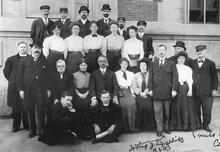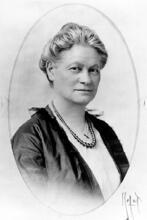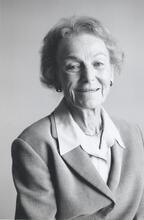Stella Heinsheimer Freiberg
Joining her father and husband, Stella Freiberg dedicated her life to progressive Jewish advocacy. She helped found the National Federation of Temple Sisterhoods, serving as the organization’s president from 1923 to 1929. In this role Freiberg advocated for women’s greater participation in the World Union for Progressive Judaism and for the Reform Movement’s merger with the global organization. Freiberg was also a supporter of the arts, cofounding the Cincinnati Symphony Orchestra in 1894 and serving as vice president of its board. In the late 1930s she also became director of the Cincinnati Art Museum.
A memorial in the American Israelite newspaper remembered Stella Heinsheimer Freiberg as a woman whose “piety was never stuffy and revealed itself in endless good deeds.” Two causes absorbed most of Freiberg’s energy: helping the arts flourish in her hometown of Cincinnati, Ohio, and furthering the growth of Reform Judaism—and the role of women in it—in the United States and Western Europe.
Family and Education
Freiberg was born in Cincinnati on November 29, 1862, to Louis and Emma (Goodhart) Heinsheimer. Louis Heinsheimer, born in Germany, was a partner in a prosperous Cincinnati cotton brokerage firm with J.H. Goodhart, whose daughter Emma would become his wife. The Heinsheimer family had a long history of involvement in the institutions of Reform Judaism. Louis Heinsheimer had been a member of the executive board of the Union of American Hebrew Congregations (UAHC) since its inception in 1873. One of Stella’s older brothers, Edward, enrolled in the first class of students at the Reform Hebrew Union College in 1875, and later became the second president of the college’s board of governors.
Stella was the second youngest of six children. Like her siblings, she received her education from Cincinnati’s public schools. After high school, she attended the College of Music at the University of Cincinnati. A member of the college’s first graduating class, she was certified as a music teacher in 1880.
In 1894, at age twenty-three, she married J. Walter Freiberg, who was a partner in Freiberg and Workum, Distillers. He was the son of a prominent German Jewish Cincinnati businessman who cofounded the distillery. The Freibergs, like the Heinsheimers, had a long history of involvement with the Cincinnati-based Reform Movement. Stella and J. Walter Freiberg had one child, Julius, who became a manufacturer of machinery and a member of the executive board of the UAHC. From 1911 until his death in 1921, J. Walter Freiberg served as president of the UAHC, an office that both his father and father-in-law had held.
Career
During her husband’s tenure as president, Stella helped to found the National Federation o0f Temple Sisterhoods (NFTS), a women’s agency within the UAHC. She served as national vice president of the NFTS from its founding in 1913 until 1923, and worked on numerous national committees, including the Committee on Sabbath Schools and the National War Emergency Committee.
Freiberg was also one of the ten women who founded the Cincinnati Symphony Orchestra in 1894 (another was Mrs. Charles P. Taft, sister-in-law of the president), and served as the first vice president of its board of directors. Because of her affiliation with the symphony, her home became a salon for great musicians of the era. She hosted, among others, George Gershwin, Arthur Rubinstein, and Leonard Bernstein. Freiberg herself “scribbled” music for the piano, but she never published it.
After her husband’s death, Stella Freiberg became even more active in civic and Jewish life. In 1923, she became president of the NFTS, a position she held until 1929. One of her most significant acts as president was to strongly endorse the proposal that the UAHC and NFTS join the World Union for Progressive Judaism (WUPJ). She especially advocated the presence of women at WUPJ conferences and urged that women be given a voice in the proceedings. She was also instrumental in securing scholarships for European students who wished to study for the Reform rabbinate at Hebrew Union College.
On a local level, Freiberg was a member of the board of directors of both the Cincinnati Section of the National Council of Jewish Women and of the Jewish Social Agencies of Cincinnati. In 1923, she donated a gymnasium to Hebrew Union College and helped raise funds for its dormitory. In 1945, she received an honorary doctorate from the college in recognition of her numerous contributions to the school and to the Reform Movement at large.
She also continued her activities in the world of fine arts. In the late 1930s, she was the director of the Cincinnati Art Museum. In the 1940s, she turned her musical connections, social skills, and large domestic staff into a business called At Your Service, which provided professional catering at musical gatherings at her house and other locations.
Later Life and Legacy
In her later years, she devoted herself to her family, helping to raise her three grandchildren and eight great-grandchildren. She also remained a presence at the synagogue and the symphony. She died on January 20, 1962.
Music and Reform Judaism shaped Stella Freiberg’s identity. The symphony that she helped to found brought music and musicians to her beloved Cincinnati. As a founder of the National Federation of Temple Sisterhoods, she followed a family tradition of involvement with the Reform Movement, creating within it a special place for Jewish women.
AJYB 64:493.
Balin, Carol B., Dana Herman, Jonathan D. Sarna, and Gary P. Zola, eds. Sisterhood: A Centennial History of Women of Reform Judaism. Cincinnati: Hebrew Union College Press, 2013.
EJ.
Freiberg, Stella. Papers. Mrs. J. Walter Freiberg Collection, and World Union for Progressive Judaism Collection, Ms. 16. AJA, Cincinnati, Ohio, UJE.
WWIAJ (1926, 1938).








![roisman.jpg - still image [media] roisman.jpg - still image [media]](/sites/default/files/styles/medium/public/mediaobjects/roisman.jpg?itok=7iKIF0ev)




